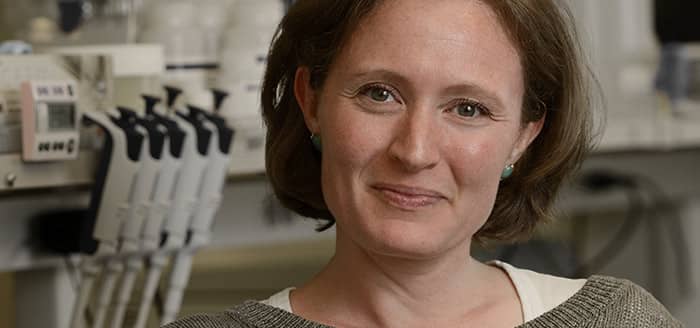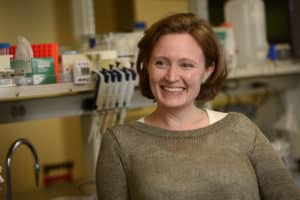Dr. Chapuis: Searching for the Right Immunotherapy Among Thousands of Possibilities

Dr. Aude Chapuis, an assistant member of the Fred Hutchinson Cancer Research Center and professor at the University of Washington School of Medicine, is at the forefront of cancer research. Specifically, she is looking into developing entirely novel ways to modify the immune system so that it targets – and hopefully eradicates – cancer in a person’s body.
Recently, the Mesothelioma + Asbestos Awareness Center caught up with Dr. Chapuis to learn more about her and the work that she is doing.
Improving T-Cell Response
When working with the immune system, a big part of the process is understanding how T-cells work. These cells, a type of lymphocyte or white blood cell, are one of the primary methods by which the immune system attacks cancer and other diseases. By understanding the factors associated with adoptive transfer of immune T-cells – that is, the process of transferring immune cells into a patient – Dr. Chapuis and her team are looking to improve the therapeutic efficacy of both natural and gene-modified T-cells that target viral and tumor antigens.
“The decision to use a patient’s T-cells is usually considered late,” says Dr. Chapuis, “when there are no other effective options available. When the patient’s gone through standard chemotherapy and their disease is still detectable, that is when patients become eligible to receive T-cells that are genetically able to recognize their tumor.”
This sort of work with T-cells and immune system response is what Dr. Chapuis and her colleagues at the Fred Hutchinson Cancer Research Center – known affectionately as “Fred Hutch” – have become recognized for pursuing. They were awarded a grant by The V Foundation, another cancer research center, specifically for their work with targeting non-small cell lung cancer (NSCLC) and mesothelioma using transferred tumor-specific T-cells.
During the study, Dr. Chapuis and her team looked at how the transferred T-cells reacted in the patient. “What happens after? Where do they go? Do they function? Which transferred cells survived? From what subset?” Dr. Chapuis asked. “It took four years to find T-cell receptors that recognize tumor antigens used to confer tumor recognition to the patient’s own cells.”
The Fred Hutch partnership with The V Foundation allowed the researchers to screen a lot of donors to find the best ones within each group. “Manually, it was very labor intensive,” Dr. Chapuis acknowledged. “However, with The V Foundation grant, we were able to find ways to rapidly get there in six weeks. Through new technologies and new ways of screening, we are getting there faster.”
A Rising Star in Cancer Research
Although her lab is a young lab, having only opened in 2015, Dr. Chapuis and her team are not holding back at all. “We’ve explored a lot of different avenues, targeting tumors with T-cells and pursuing targets we don’t have funding for yet,” Dr. Chapuis said. “We’ve been able to generate preliminary data that we never would have been able to do if we were bound by some of the limitations of other grants.”

Dr. Aude Chapuis taken on June 9, 2015 at Fred Hutchinson Cancer Research Center.
Part of the reason that Dr. Chapuis is able to take her research in such new and unique directions is due to the fact that she is one of five recipients of the 2016 Fred Hutch Young Investigator Award. Similar to the MacArthur “genius grants,” this award provides young researchers with $100,000 in unrestricted funding for their laboratories, allowing them to pursue the things that they believe will bring the best results. This gives researchers like Dr. Chapuis a certain level of freedom to follow their research wherever it takes them.
And the research Dr. Chapuis has been doing has already been paid off. In discussing the results of her work, she said, “It used to take four years to develop one T-cell receptor. Now we have the capability to develop 10 in two months.”
Trying New Methods to Treat Mesothelioma
When it comes to current clinical trials, Dr. Chapuis has her eye on one specifically in which six mesothelioma patients have undergone immunotherapy treatment so far. “Some patient have progressed,” she said. “Really we’re trying to learn how this type of therapy works, to see if this therapy is safe for the patients.”
The treatment being used in the trial takes T-cells that come from the patient, transduces the T-cells with a molecule or T-cell receptor that then allows the patient’s own T-cells to recognize their tumor and kill the bad cells. The cells are grown to billions and then infused back into the patient. “There are not many side effects, except for the first 24 hours, but it goes away after awhile,” Dr. Chapuis explained. “In some patients the T-cells persist, and we’re trying to figure out how to make them persist in patients even longer.”
In one patient, Dr. Chapuis said, the tumor decreased in a mesothelioma patient. When the mesothelioma regressed, the patient had more T-cells in her lungs where the tumor was then in the blood, suggesting that the T-cells go to the tumor site. “This is only preliminary data, based off of less than six months, so it’s hard to tell right now,” Dr. Chapuis acknowledged, but the early results seem promising.
Dr. Chapuis believes that modulating the immune system shows a lot of promise for treating mesothelioma and other cancers in the future. Tumor antigens like the Wilms Tumor Protein (WT1) are overexpressed in many tumors including leukemias, non-small cell lung cancer, ovarian cancer, and mesothelioma. “They take T-cells from patient or a bone marrow transplant donor, and genetically modify T-cells to express a T-cell receptor,” Dr. Chapuis described the process. “The T-cell needs this to recognize the tumor.”
The Importance of the Cancer Moonshot for Mesothelioma
Through these and other studies like them, Dr. Chapuis believes we are getting closer. “Immunotherapy is very promising,” she states. “A lot of people are feeling that way.”
Nonetheless, finding the right form of immunotherapy is a big challenge. The WT1 antigen is just one of thousands of potential immunotherapy targets for mesothelioma.
“Depending on the disease, WT1 could be expressed in other tissues, so we have to deal with that,” Dr. Chapuis said. “Certain antigens are virally driven (not in mesothelioma), and constitute very attractive targets for immunotherapy.”
“There are some antigens that are specific to mutations of the tumor, which is exciting – but it’s very dependent on the person. We are essentially developing very targeted, very personalized medicine. We have to figure out what T-cell receptors recognize which tumors, and then understand how strong they are. The challenge is how to make these cells go to the tumor and persist for a long time in the patient so the tumor does not come back.”
This is why initiatives like the Cancer Moonshot are so important. Recently, Vice President Joe Biden announced new measures to help cancer patients navigate the clinical trials process. Currently, the process is very difficult, with only about 5% of cancer patients enrolling. However, if more people could participate, then the hope of finding a cure – or many individual cures for different types and subtypes of cancer – would be within easier reach.
“Increasing trial participation is great,” Dr. Chapuis affirmed. “For T-cell therapy, where the cells are being grown you need to patient to be here (at Fred Hutch). So many risks are involved because it’s gene therapy. There has to be a way – with better insurance, better access, or even just better awareness – to help patients to travel to get this type of therapy.”